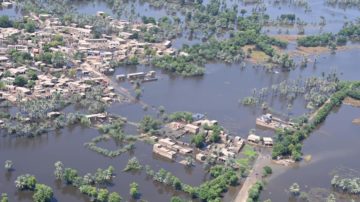Nazish Brohi in Guernica:
 After they find dry ground for refuge, tie up surviving livestock, scan the ground for snakes and scorpions, queue, break queue and grab for food, plead for water, scream for tents, weep for loss, curse officials, lament fate — after all that, people whose lives have been upended by floods want to talk. I tell them I can’t do much. I am a researcher documenting and analyzing disaster impacts for various organizations, and it can be months before anyone even reads my reports. But sometimes, it’s enough for them to find someone who will listen.
After they find dry ground for refuge, tie up surviving livestock, scan the ground for snakes and scorpions, queue, break queue and grab for food, plead for water, scream for tents, weep for loss, curse officials, lament fate — after all that, people whose lives have been upended by floods want to talk. I tell them I can’t do much. I am a researcher documenting and analyzing disaster impacts for various organizations, and it can be months before anyone even reads my reports. But sometimes, it’s enough for them to find someone who will listen.
Their stories are preserved in my scribbles from Pakistan’s 2010 superfloods, amber-toned by the resin of old grievances. And there are other, newer ones from this year’s record-breaking “Monster Monsoon” floods, not yet tinged by time and age; instead, they hold the clarity and acidity of vinegar. A few of the stories make it to my reports as case studies or three-line illustrations of my analyses. The rest lie in my soundproof vault of secondary grief.
More here.
